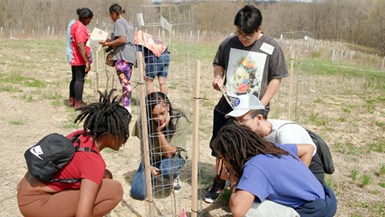PPG Commits $5 Million to Environmental Sustainability Education
The investment focuses on empowering and educating the next generation and communities on sustainability.

PPG funding will support programs similar to NEEF’s Greening STEM project in Cuyahoga Valley National Park. The program engages middle school students in native tree planting and scientific research and monitoring. Photo Credit: NEEF
PPG and the PPG Foundation are committing to investing $5 million by 2030 in environmental sustainability education. Aligning with PPG’s 2030 sustainability targets and priorities, the commitment aims to strengthen support for the next generation of innovators and maximize the impact within communities where PPG operates. The company will support programs that meet the specific environmental needs in markets where it operates, aligned with climate action and a more circular economy.
“Sustainability is an integral part of delivering on our promise to protect and beautify the world,” says Malesia Dunn, PPG executive director, PPG Foundation and corporate social responsibility. “Through this investment, we aim to educate young people around the world about climate issues, environmental stewardship, and prepare them for future STEM careers.”
PPG and the PPG Foundation will support educational programming related to topics such as clean energy, climate change, energy efficiency and reforestation. Related to the circular economy, PPG and the PPG Foundation will support educational and volunteer efforts around recycling, reuse and litter reduction.
There are partnerships and programs already established as part of that commitment. One of these includes working with the National Environmental Education Foundation (NEEF) to develop two “Greening STEM” programs that engage more than 600 middle school students in hands-on environmental investigations in Pittsburgh, Pennsylvania, and East Point, Georgia. The National Energy Education Development (NEED) is also partnering with PPG to deliver two teacher workshops in Pittsburgh, Pennsylvania, and Cleveland, Ohio, that will assist grade 6-8 educators in building content knowledge and capabilities for teaching energy topics in the classroom.
Across seas in the U.K., PPG has partnered with the STEM Learning organization to support a program that provides professional development for educators, including courses to learn how to teach about environmental sustainability concepts. Similarly in Brazil, PPG is building on an existing, long-term partnership with Junior Achievement to support the “Attitude for the Planet” program, which engages PPG volunteers and educators to teach environmental sustainability to high school students.
“We believe that STEM careers are at the cutting edge of innovation, and that they will help develop new technologies and processes that can help to address climate change and protect our environment,” Dunn says. “We want to prepare this generation — and generations to come — for this important role.”
Related Content
-
How to Maximize Nickel Plating Performance
The advantages of boric acid-free nickel plating include allowing manufacturers who utilize nickel plating to keep up the ever-changing regulatory policies and support sustainability efforts.
-
Practical Environmental Management Reduces Costs, Refines Quality
By focusing on effluent treatment and efficient tin recovery, this Indian surface treatment plant meets stringent environmental standards and sustainable high-quality production.
-
Hexavalent to trivalent chromium — the environmental benefits
Regulatory pressures to switch from hexavalent chromium to trivalent alternatives are a growing concern for many finishing operations. In this Products Finishing Ask the Expert clinic, Brittany McKinney of Pavco discusses the environmental considerations driving these regulations.










.jpg;maxWidth=300;quality=90)




